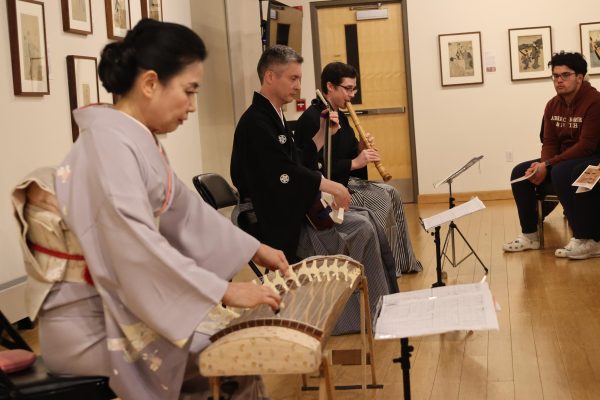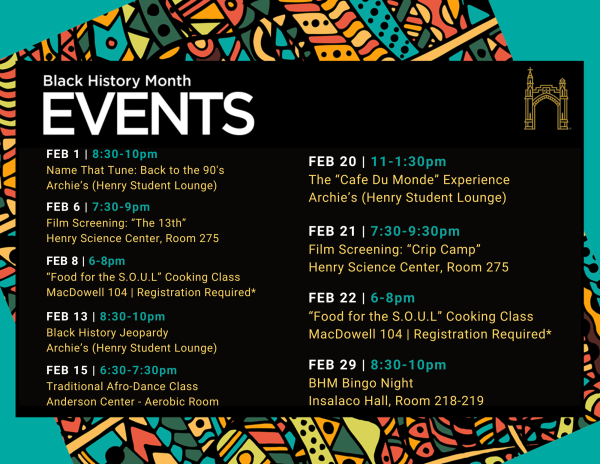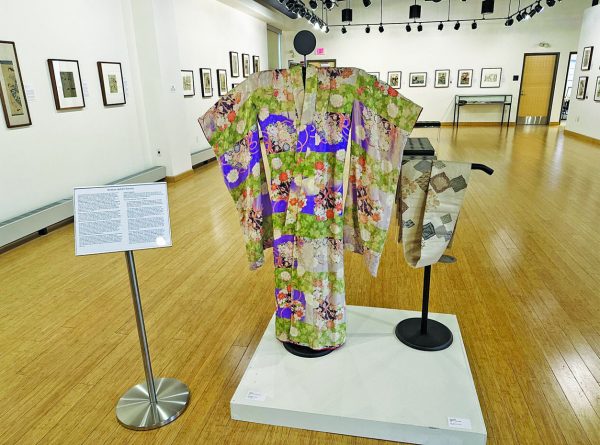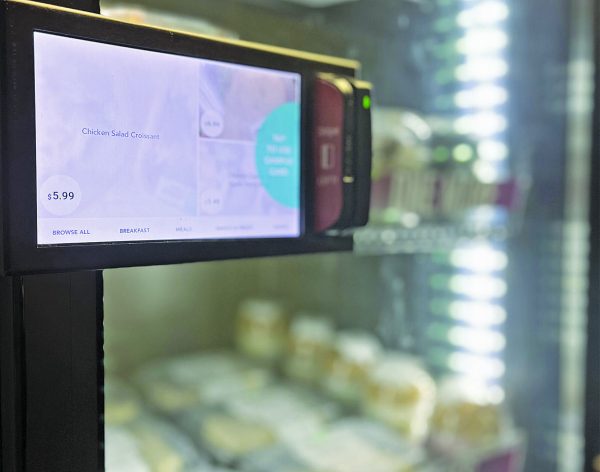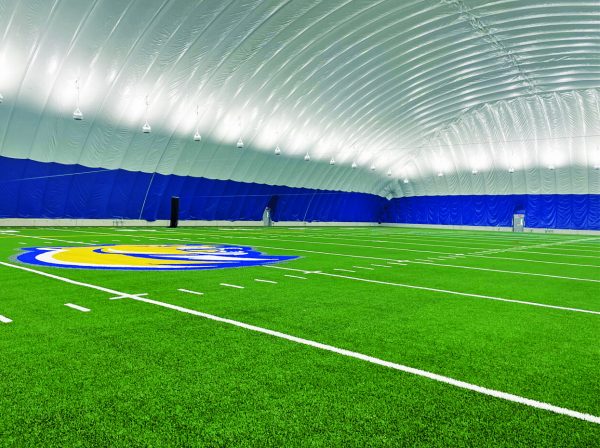Officials Seek and Use Student Feedback
April 21, 2016
School officials are seeking and using student feedback for decisions they make regarding everything from new amenities to the kinds of events and activities held on campus.
Officials state that surveys, evaluations, conferences, and committees are just some of the ways in which they receive student feedback.
According to Darcy Brodmerkel, Director of Student Activities, her department runs surveys twice a year in which students are asked what they would like to see on campus. Brodmerkel also has an open-door policy allowing students to talk with her about any idea they may have.
Brodmerkel said there are other ways that students can use their voice to influence happenings on campus.
“We have evaluations after the end of each show that we have [on the weekend], but we take a random sampling of the students and the events and we ask them certain questions. So we always ask [students] and give [them] an opportunity to tell us what they’d like to have,” said Brodmerkel.
Many ideas come from a few students who accompany Brodmerkel to either the Association for Promotion of Campus Activities or National Association of Campus Activities conferences each year.
Brodmerkel said that those conferences help these students decide what they think will be fun for the whole campus.
“[These] student activities conferences [is where] all these different performers do just that, they perform to the students, and then the students come back and say ‘we like this person, we like this game show, we like this novelty,’ and then I work at booking them,” she explained.
MAC WTF, which stands for Misericordia Activity Committee – Where’s the Fun?, is another opportunity for students to express their views. It consists of a team of students who consider more ways to give the other students on campus a chance to create new activities.
“We kind of renamed it ‘WTF’ as in where’s the fun, and those students will come up with some ideas and ways to get students involved in having some other activities,” said Brodmerkel.
She added that the students have the answers.
“The students are going to know better than I. They know what it is they want,” said Brodmerkel.
Student feedback can benefit everyone on campus, Brodmerkel said, and she appreciates hearing what students have to say.
“There’s plenty of opportunities to do things and get involved to make them happen. I certainly try to help them or encourage them because it’s only better for us. It gives us more to do here,” said Brodmerkel.
Kit Foley, Vice President of Student Life, said school officials try to listen for common themes that the students are talking about.
“If we hear similar things from a variety of students, that is where we try to work [and] make changes,” explained Foley.
Foley aims to give students the opportunity to participate in strong, varied, and appropriate programs to support their educational experiences.
“The areas that fall within the division are athletics, the Health and Wellness center, CAPS center, Student Activities, Residence Life, orientation, Insalaco Center for Career Development, the Dean of Students, and student conduct.”
“We work together to make sure students have the opportunity to learn about themselves and others, strengthen their leadership and communication skills, and enjoy their experience,” Foley explained.
Foley said it is very important for officials listen to students. Through campus life, she hopes to provide “comfortable places where students can gather to learn and make friends, an opportunity for growth, and opportunities to talk about important issues.”
To provide students with these opportunities, their voices and feedback are represented through Student Government Association, which is part of the shared governance of the university. “The President of SGA attends and participates in the University’s Leadership Council comprised of the president, all the vice presidents, deans, and other administrators. Students are also representatives on the Board of Trustees committees. Many of our departments have student advisory boards or groups that act in that capacity,” Foley said.
Foley said she and her team use Survey Monkey or offers surveys in the lobby of Banks to facilitate student input.
“I think our faculty and staff work really hard to encourage students to connect and get involved. By doing so students have great learning opportunities and develop skills for their professional careers,” Foley explained.
Brodmerkel stated that students recently came into her office with a list of activities that they would like to see on campus. “Painting with Passion,” comedians, hypnotists, popular concerts, game night, board night, themed dances, a Vera Bradley bingo, cooking class, pottery class, and kickboxing are all on the students’ list.
Brodmerkel said she takes every suggestion seriously. “I look over what I’m currently doing and if there’s things that I can add based upon their suggestions, I do it! So it’s their input [that] is what makes up my calendar.”
Brodmerkel admits that some ideas are hers, but other times, students brainstorm activities that she will confirm if she believes they can be done or deny them if they are not feasible.
“I think [school officials] are doing a good job with trying to make everyone happy,” said Amanda Rando, sophomore undeclared. “It probably gets hard because there are so many students with different opinions.”
As a commuter, Rando doesn’t feel the need to express her opinions because she does not stay on campus long enough to enjoy activities.
“I also have a job so it’s hard for me to get to the activities that the school holds.”
Rando would like to see more activities that have commuters in mind.
“If all the dormers go to the event, they know more people and, me, as a commuter, would feel out of place if I were to go, which would make me feel weird and prevent me from having fun.”
Alliyah Moore, sophomore, government, law and national security major, lives on campus, and she suspects that some students aren’t aware of many activities.
“They aren’t bad activities. I just think the promotion of them isn’t as obvious,” said
Moore said that it gets hard to voice her opinion because of her busy schedule with school work and she cannot find the time. Instead, Moore suggests that school officials offer students a variety of activities and then choose the three most popular based upon students’ feedback.
Moore believes that officials try their best to use students’ suggestions for decision-making, but she added that she would like to see more age-appropriate events.
“There should be things that are targeted for students in our age group,” said Moore.
The most common request by students is “big concerts” with “headliners that are well out of our realm of thinking,” said Brodmerkel. She said she aims to hold a concert every two years.
“We will think a little bit bigger, and hopefully we’ll get the students to participate,” said Brodmerkel.
Samantha Rehrig, fifth year occupational therapy and psychology major said that throughout her years living in the dorms, she noticed a change in the way the school reached out to students to give them more of a voice.
“They actually do surveys now and they have the Student Activities committee. Before they would just schedule things based on what they thought [students] wanted to do,” said Rehrig.
Rehrig explained how officials attempted to keep the students entertained. “I think they tried to have stuff every weekend, if not every other weekend, which was good because a lot of the time students went home but there were still students who stayed on campus so they provided a nice variety of things to do. You [also] don’t have to go down to Wilkes-Barre to have something fun to do which is helpful as busy OT majors,” Rehrig said.
Other new ideas that will help bring more life to campus and will depend on student feedback is the idea of a new coffee lounge in Banks.
“We have been getting input from the students during our listening sessions. We are exploring converting the lounge in The Banks Student Life Center into a coffee lounge area. No final decisions have been made yet,” said Foley.
Foley stated that over the past few years, students have voiced an interest in a coffee lounge. She believes that this attraction would be a great gathering spot for the students and staff.
The coffee shop would provide a place to gather, talk, and attend events while enjoying good company and great beverages.
“Think about how many Starbucks, Dunkin Donuts and other coffee shops are around. Students today have grown up on their special coffees and iced drinks and I bet will enjoy having one on campus,” said Foley on the success of the possible coffee shop.
Both Brodmerkel and Foley strongly encourage the students to get involved and share their thoughts.
“I don’t have as much direct contact with students as I used to, but when I am with students I am usually asking them about their experiences and listening to their suggestions,” Foley stated.
Longer hours in the Cougar’s Den during finals is an example of one of those common themes once requested by students and granted.
Foley humbly explained that she isn’t the only one who brings these ideas to life.
“We are a team and I have wonderful directors and staff who work hard to offer the best for our students. It is not about me but ‘us’ and we work together to offer the best we can,” said Foley.
“Some students are involved and others have chosen not to be. I would encourage every student to try something. You never know where you will find your passion,” said Foley.

